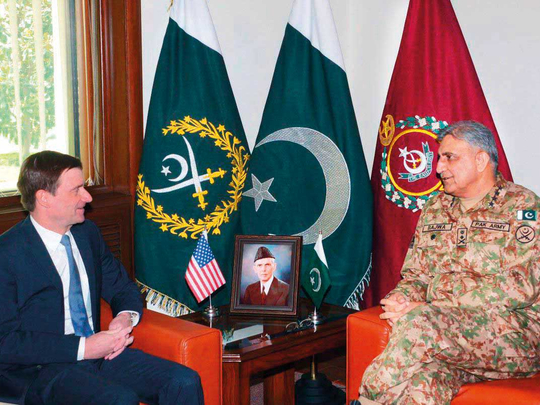
Islamabad: The Foreign Office on Wednesday has strongly reacted against America’s policy shift in the region and rejected US President Donald Trump’s allegations that Pakistan offers safe haven to “agents of chaos”.
Pakistani officials are discontent as the US disregarded contributions and sacrifices made by Pakistan in its fight against terrorism.
“It is disappointing that the US policy statement ignores the enormous sacrifices rendered by the Pakistani nation in this effort,” the Foreign Office said in a statement.
“No country in the world has done more than Pakistan to counter the menace of terrorism. No country in the world has suffered more than Pakistan from the scourge of terrorism, often perpetrated from outside our borders,” the statement said.
Reacting to US president’s statements on the 16-year-long war in Afghanistan, the Foreign Office in a statement said: “Pakistan does not allow use of its territory against any country. Instead of relying on the false narrative of safe havens, the US needs to work with Pakistan to eradicate terrorism.”
Responding to Trump’s call for more US troops in Afghanistan, it said that Pakistan’s view that there is “no exclusive military solution to the crisis in Afghanistan”.
The military action during the last 17 years has not brought peace to Afghanistan, and it is not likely to do so in the future.
“Only an Afghan-led and Afghan-owned politically negotiated solution can lead to sustainable peace in Afghanistan,” it added.
The statement reiterated Pakistan’s commitment to “working with the international community towards the common objective of defeating the forces of terrorism and to promote peace and stability in the South Asian region.”
Foreign Minister Khawaja Asif said that Pakistan has fought the war against terrorism on its own accord and would continue to do so as it is not reliant of anyone’s money to fight its war.
In a late evening development, Pakistan Army Chief Qamar Javed Bajwa summoned US Ambassador to Pakistan, David Hale, at the GHQ (headquarters of Pakistan Army) to convey his concerns.
“We are not looking for any material or financial assistance from USA but trust, understanding and acknowledgement of our contributions,” Bajwa said.
COAS said that peace in Afghanistan is as important for Pakistan as for any other country. “Collaboration between all stakeholders is the key to success to bring this long-drawn war in Afghanistan to its logical conclusion,” he concluded.
Afghan instability
Pakistan’s Ambassador to the United States Aizaz Ahmad Chaudhry said on Wednesday that there are no terror safe havens in the country. “Peace and stability in neighbouring Afghanistan is in favour of Pakistan as we are paying a heavy price for instability in Afghanistan for the last 38 years” he said.
Only Afghan-led dialogue can bring peace in the neighbouring country, the Ambassador said, adding that Pakistan wishes to maintain a productive dialogue with Washington to ensure stability in the region.
In Pakistan, analysts termed Trump’s speech worrisome, especially since he also urged Pakistan’s arch rival India to increase its economic role in Afghanistan.
Pakistani analysts and politicians agreed that Pakistan should strongly react to the new American strategy and ‘reject being made scapegoats for US policy failures’.
PTI chief Imran Khan said: “We fought two wars in Afghanistan at the US’ behest [while] paying heavy human and economic costs both times. We sacrificed 70,000 lives in the US War on Terror. Our economy suffered over $100 billion (Dh367 billion) in losses.” He added that it is time “for Pakistan to say ‘never again’ and “We must also reject being made scapegoats for the policy failures of the US and India.”
Analysts voiced concern over US President Trump’s call on India to help Afghanistan. “Is it not amazing that President Donald Trump is asking Pakistan to do more in the war while he wants Pakistan’s enemy number one — India — to invest in Afghanistan” remarked senior journalist Rahimullah Yusufzai.
Mosharraf Zaidi, a foreign-policy analyst in Islamabad, believes that “By inviting India to be more active in Afghanistan, Trump has confirmed the worst fears of Pakistan’s generals: that America is in cahoots with India against Pakistan.” PTI leader Asad Umar said: “There is no solution in Afghanistan without bringing all segments of Afghanistan on board and addressing the legitimate concerns that Pakistan has.” He added that “Trump is threatening to go back to an Afghan policy of troop build-up and pressure on Pakistan — A policy which has failed to deliver in 16 years.”
Commenting on the US policy, politician and former Pakistani ambassador to US Sherry Rehman said it was “disturbing and disappointing to hear a repeat of Pakistan being pressured to do more to stabilise Afghanistan.” She said her country has “given unparalleled sacrifices” to fight terrorism.
Mushahid Hussain, a Pakistani politician, said: “President Donald Trump’s much-touted Afghan strategy is essentially a facelift of a tried, tested and failed formula. Criticising Trump’s new policy Hussain writes: “16 years and $1 trillion later, what can 4,000 more American troops do which over 100,000 American troops could not achieve?”
He believes including India into the Afghanistan issue and lack of any military solution is a sure recipe for disaster.
Lt. Gen. (R) Abdul Qayyum who also heads the senate committee on defence production, said “instead of acknowledging Pakistan’s sacrifices and achievements in fighting militancy, accusations by the US president disappointed the people of Pakistan.”
A senior Pakistani analyst Dr Zafar Nawaz Jaspal, said Pakistan can certainly survive without minor US assistance as it is economically stable. “The amount they [US] are giving to Pakistan under coalition support fund is minor and cutting it would make no difference to Pakistan,” said Dr Jaspal, Professor of International Relations at Quaid-e-Azam University. Pakistan simply wants the US to respect and acknowledge the sacrifices it has rendered in war against terrorism rather than highlighting the issue of financial assistance, he said.












